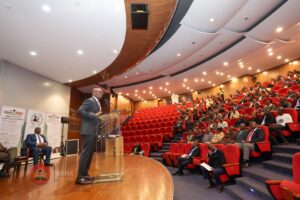Govt to Offer Part-Time Jobs to University Student Leaders
Share
The government has announced plans to provide part-time jobs to all university student leaders as part of an initiative to strengthen youth participation in governance and national security structures.
As part of this broader plan, the government is exploring the inclusion of student leaders, deans of students, and campus chief security officers in county and sub-county security and intelligence committees.
This initiative aims to ensure that students’ concerns are promptly heard and addressed while enhancing the safety of learning institutions across the country.
According to the Principal Secretary for Internal Security and National Administration, Dr. Raymond Omollo, the move aligns with the government’s commitment to ensure that universities and colleges remain safe, peaceful, and conducive for learning.
“We must embrace our student leaders in these structures so that we are able to pick up information or issues in good time and intervene before problems escalate,” said Dr. Omollo.
He further urged institutions of higher learning to collaborate with the National Counter Terrorism Centre (NCTC) to facilitate regular countering violent extremism (CVE) dialogues.
“Our goal is to create an ecosystem where learning thrives free from fear, manipulation, or harm. Security begins with awareness, partnership, and shared responsibility, and our students must be part of that equation,” he added.
Strengthening Partnerships in Security
Speaking during the Jukwaa La Wasomi series held at the University of Nairobi, Dr. Omollo highlighted that the Ministry has been working closely with the Universities and Colleges Students’ Peace Association of Kenya (UCSPAK) to improve engagement between students and security agencies across the country.
“This is part of our broader effort to foster stronger partnerships between student leaders and security agencies, and to create awareness on the role of the youth in promoting peace,” said the PS.
He revealed that the government continues to organize meetings between student leaders and county security committees to enhance youth involvement in peace and security efforts at both the county and national levels.
Proposals to Improve Campus Safety
The forum, which brought together deans of students, university administrators, and representatives from institutions of higher learning, underscored the importance of targeted conversations between students and policymakers.
Participants proposed several measures to enhance campus security, including the installation of CCTV systems and streetlights, fencing of institutional premises, early issuance of student IDs, and inclusion of student leaders in county-level security discussions.
They also called for greater coordination among universities, security agencies, and local communities to mitigate security risks and create safer learning environments.
Additionally, the Nyumba Kumi model will be expanded to include students residing off-campus, while orientation programs will now feature safety and security briefings.
Tackling Social Challenges
Among the key issues discussed were drug and substance abuse, campus insecurity, gender-based violence, radicalization, mental health, academic integrity, and unemployment.
Dr. Omollo expressed concern over the alarming rate of gender-based violence in learning institutions, stating that it affects approximately 36 percent of students.
“To think that such cases are being experienced within our institutions of higher learning is a wake-up call. It is a clear indication that something has gone terribly amiss. We must therefore find sustainable and collective solutions to address this challenge and restore safety, dignity, and trust in our learning environments,” he stated.
The forum also urged for preventive approaches to drug and substance abuse, recommending a standardized national response by NACADA, increased professional counseling services, collaboration with parents and community leaders, and tighter regulation of alcohol and drug-related advertisements targeting young audiences.
NYOTA Program
Dr. Omollo further outlined the government’s plan to intensify the NYOTA Program, a nationwide youth empowerment initiative targeting individuals aged 18 to 29 who did not progress beyond secondary education.
“Across all the 47 counties, we are rolling out what we are calling the NYOTA Program, which is targeting young people between the ages of 18 and 29 years. These are youths who may not have pursued education beyond Form Four, yet they represent a significant portion of our population,” he explained.
Under the initiative, 70 young people in each of the 1,450 wards will receive a cash grant of KSh 50,000 to support entrepreneurship and income-generating ventures.
The program also acknowledges prior learning, especially technical and vocational skills gained informally, as part of empowering youth to contribute meaningfully to the economy.

Interior and National Administration PS Dr. Raymond Omollo. PHOTO/ MINA X.
